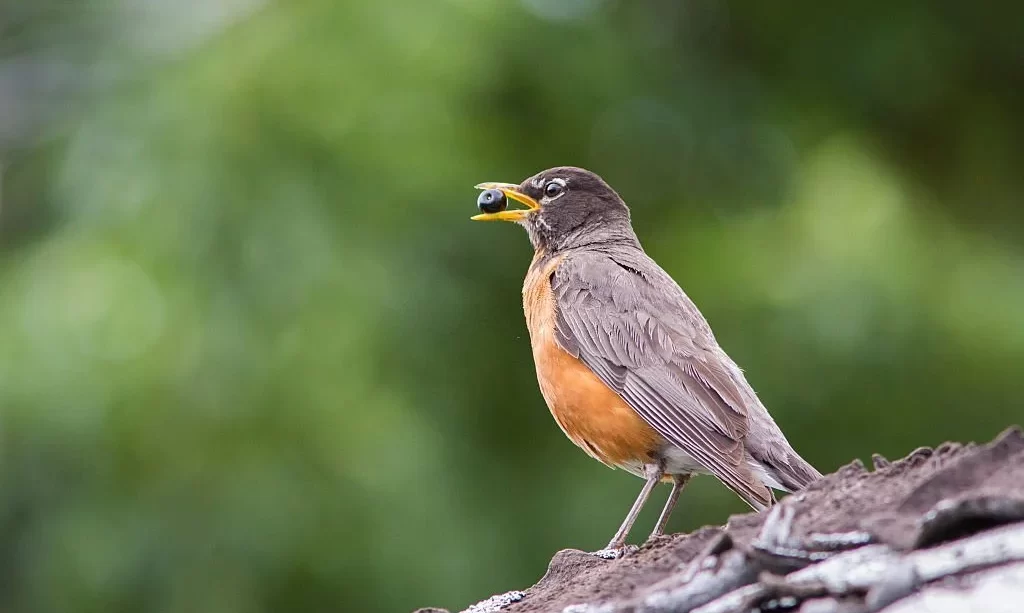Birds, with their colorful plumage and enchanting songs, bring life and vibrancy to our gardens. As gardening enthusiasts, we often find joy in watching these feathered friends visit our outdoor spaces. One question that might have crossed your mind is, “Can birds eat blueberries?” In this article, we’ll explore the delightful world of providing blueberries to birds. These tiny, flavorful berries are not just a treat for us; they can also be a nutritious snack for our avian companions. Let’s delve into the fascinating realm of whether birds can savor the sweet, juicy goodness of blueberries.
- Seeds and Suet Nuggets are 100% edible
- No mess on your lawn
- Attracts two times more birds than black oil sunflower alone
- Attracts three times more woodpeckers than black oil sunflower alone
- For use in tube, hopper or platform feeders
Blueberries as a Nutritious Snack for Birds
Blueberries, those little gems of the fruit world, are renowned for their health benefits, and it turns out, our feathered friends can enjoy these benefits too. These tiny fruits are packed with essential nutrients, making them a nutritious snack for birds. Blueberries are loaded with antioxidants, which can help protect birds from oxidative stress, much like they do for us humans. Additionally, these berries contain essential vitamins and dietary fiber, contributing to the overall well-being of our avian visitors. So, let’s take a closer look at why blueberries are a delightful addition to a bird’s diet.
Birds that Love Blueberries
When it comes to birds and blueberries, there’s a delightful connection that has been observed over the years. Several bird species have developed a fondness for these tiny, blue-hued fruits. Among them, the Eastern Bluebird stands out, not just for its name but also for its preference for blueberries. These vibrant birds are known to relish the sweet taste of ripe blueberries. Similarly, American Robins, with their cheerful demeanor, are often spotted feasting on blueberries, especially during the summer months. Thrushes, another group of avian enthusiasts, also show a keen interest in these berries. It’s truly heartwarming to watch these birds indulge in a berry buffet right in your garden. So, if you have blueberries in your garden, chances are you’ll have some colorful feathered guests dropping by for a snack.
How to Offer Blueberries to Birds
Now that you know some birds are fans of blueberries, you might be eager to provide them with this tasty treat. But how do you go about it? The good news is that it’s relatively simple. One effective way is to use bird feeders. There are specialized feeders designed to hold blueberries or other fruits. These feeders can be hung in your garden or placed strategically where birds frequently visit.
Alternatively, you can scatter blueberries on a tray or platform feeder. This allows multiple birds to enjoy the berries at once and provides a natural dining experience. If you’re more into landscaping, consider planting blueberry bushes in your garden. Birds will happily pick the berries straight from the bush when they’re ripe.
However, it’s essential to maintain cleanliness and hygiene when offering blueberries to birds. Moldy or spoiled berries should be removed promptly to prevent any harm to our feathered friends. By providing blueberries in a bird-friendly way, you can not only attract these delightful creatures but also contribute to their well-being in your garden.
- Premium Bird Feeding Station Kit: Enjoy watching beautiful colors as wild birds drink and eat. Put it outside your home, near a window or patio, with a clear view to enjoy pleasant entertainment. Dimensions: 77 x 19 inches. (Please note, contents of feeders are NOT included).
- All in One: Comes with 4 top level hooks which are ideal for hanging lots bird feeders. A additional hook, mesh tray and water tray can be adjust completely to fix anywhere of the pole. Watering and bathing solution for garden birds and will help to attract a wide variety of birds to your garden.
- High Quality: Our bird station is coated with black anti-rust coating, sturdy bird multi-feeder stand is an area of your yard where you have bird feeders set up to attract wild birds. Forked base for added stability and ease of placement.
- Easy to Install: Easily adjust components to any desired location by hand. No tools required! Forked metal stake base adds stability and permits easy placement. Four top level hooks allowed you hanging large bird feeders and other large hanging solar lanterns. Large water dish & seed tray are easy to fill and clean.
- Perfect Gift: Allowed you watch bird activity in your yard. This is the best gift for parents, children and nature lovers. Maintaining a feeding rack and making sure there are enough seeds in it can be a fun activity, which is great for keeping older people busy or teaching younger children to take responsibility.
Potential Risks and Precautions
While offering blueberries to birds can be a delightful experience, there are a few potential risks and precautions to keep in mind. First and foremost, be mindful of the source of your blueberries. If you’re using store-bought berries, opt for organic or pesticide-free varieties to ensure the safety of the birds. Pesticides can be harmful to both birds and their food sources, so it’s essential to choose berries that haven’t been treated with harmful chemicals.
Another important consideration is moderation. While blueberries are nutritious, they should be part of a varied diet for birds. Offering too many blueberries exclusively can lead to imbalances in their nutrition. So, remember to mix things up and provide a range of foods to keep your avian visitors healthy.
Lastly, maintaining clean feeding areas is crucial. Blueberries can quickly spoil, attracting unwanted pests or spreading diseases. Regularly clean and replace the feeding equipment to ensure a safe and hygienic environment for the birds.
Observing Birds Enjoying Blueberries
One of the most rewarding aspects of providing blueberries to birds is the sheer joy of watching them indulge in these delectable treats. Setting up a cozy spot in your garden with a good view can offer hours of entertainment. You’ll likely witness a variety of bird species, from bluebirds and robins to thrushes and more, relishing the sweet blueberries.
Observing their feeding habits and interactions can provide valuable insights into their behavior and preferences. It’s a wonderful way to connect with nature and appreciate the beauty of these winged visitors in your garden. Don’t forget your binoculars and camera – you might capture some memorable moments.
Conclusion
In conclusion, the answer to the question, “Can birds eat blueberries?” is a resounding yes. Blueberries can be a nutritious and enjoyable addition to a bird’s diet. They offer essential nutrients and the pleasure of observing these colorful creatures in your garden.
By taking a few precautions, such as choosing pesticide-free berries, providing a balanced diet, and maintaining a clean feeding environment, you can create a bird-friendly haven right in your backyard. So, go ahead and share the joy of blueberries with your feathered friends. Your garden will become a haven not only for your plants but also for the beautiful birds that grace it with their presence.






